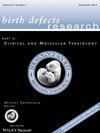Surveillance of ventricular septal defects in Delaware
Abstract
Background
The prevalence of ventricular septal defects (VSDs), a birth defect in which there is an opening in the wall that separates the left and right ventricles of the heart, seemed to be substantially higher in Delaware compared with the National Birth Defects Prevention Network (NBDPN). The Delaware Birth Defects Registry (BDR) noted their high prevalence of VSDs in comparison with other states.
Methods
A subset of children with a VSD born in 2007 through 2010 was identified from the complete reportable statewide defect list that the BDR creates each year. VSDs were categorized by type of VSD (muscular, perimembranous, conotruncal, or atrioventricular septal defect), by either isolated or complex, and then by spontaneously closed, surgically closed, open but clinically insignificant, lost to follow-up, fetal or neonatal death.
Results
The BDR team found a prevalence of VSD of 83.4 per 10,000 including fetal/neonatal deaths. Excluding fetal and neonatal deaths the prevalence was 78.7 per 10,000 live births. Excluding small muscular VSDs, the prevalence in Delaware falls to 25.7 per 10,000.
Conclusion
The BDR team chose to include all babies with all types of VSDs. Using these criteria Delaware's prevalence of 78.7 was higher than that reported by other states (whose prevalence ranges from 1.6 to 70.0 per 10,000 live births) (National Birth Defects Prevention Network, 2015a). Delaware's prevalence is similar to other states when small muscular VSDs are excluded. Birth Defects Research (Part A) 106:888–893, 2016. © 2016 Wiley Periodicals, Inc.

 求助内容:
求助内容: 应助结果提醒方式:
应助结果提醒方式:


